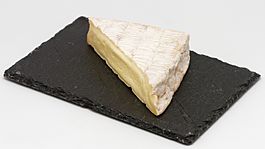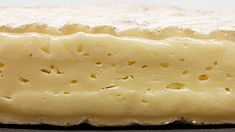Pont-l'Évêque cheese facts for kids
Quick facts for kids Pont-l'Évêque |
|
|---|---|
 Pont-l'Évêque  Texture of Pont-l'Évêque |
|
| Country of origin | France |
| Region | Normandy |
| Town | Pont-l'Évêque |
| Source of milk | Cow |
| Pasteurized | Frequently |
| Texture | Soft, washed rind |
| Fat content | Depends on variety |
| Aging time | 4-6 weeks |
| Certification | AOC 1976 |
| Named after | Lua error in Module:Wikidata at line 70: attempt to index field 'wikibase' (a nil value). |
Pont-l'Évêque is a famous French cheese. It comes from the area around the town of Pont-l'Évêque in Normandy, France. This region is known for its delicious dairy products.
This cheese is one of the oldest cheeses still made in Normandy. It is a soft cheese, meaning it's not hard like cheddar. It's made from cow's milk and is not cooked or pressed during its creation.
Pont-l'Évêque usually comes in a square shape. It's about 10 centimeters (4 inches) wide and 3 centimeters (1.2 inches) tall. Each cheese weighs around 400 grams (14 ounces).
The inside of the cheese is soft and creamy. It has a pale yellow color and a smooth texture. The outside has a special "washed rind" that is white with a light orange-brown color. This rind gives the cheese its unique, strong smell. When you press it, the cheese feels soft but doesn't bounce back much. It is as popular in France as well-known cheeses like Brie, Camembert, and Roquefort.
Contents
History of Pont-l'Évêque Cheese
This special cheese has been made in Normandy for a very long time. People believe it was first created by Cistercian monks in the 12th century. That's over 800 years ago!
When it was first made, the cheese had different names. It was called "cherub" and later "angelot." By the 16th century, it became very popular across France. That's when it got its current name, Pont-l'Évêque, after the village where it was mainly produced.
How Pont-l'Évêque is Made
Pont-l'Évêque is a protected cheese in France. It received its official status as an Appellation d'Origine Contrôlée (AOC) cheese in 1976. This means its production is carefully controlled and protected by law. The rules for making it were set in 1986.
AOC Regulations for Pont-l'Évêque
The AOC rules ensure that Pont-l'Évêque cheese is made in a traditional way. Here are some of the main rules:
- The milk must come from a specific area around the village of Pont-l'Évêque. This area includes several regions in Normandy.
- The cheese curds (the solid parts of the milk) must be cut, mixed, and then drained.
- During the aging process, called affinage, the cheeses are washed, brushed, and turned regularly. This helps develop their unique rind and flavor.
Sizes of Pont-l'Évêque
The AOC rules also define the sizes of the cheese. There are three main sizes:
- Petit: This is the smallest size. It's about 8.5 to 9.5 centimeters (3.3 to 3.7 inches) square.
- Demi: This size is about 10.5 to 11.5 centimeters (4.1 to 4.5 inches) long by 5.2 to 5.7 centimeters (2 to 2.2 inches) wide.
- Grand: This is the largest size. It's about 19 to 21 centimeters (7.5 to 8.3 inches) square.
Aging and Production Details
The cheese must age for at least two weeks after it's made. However, most Pont-l'Évêque cheeses are aged for more than six weeks to develop their full flavor.
Pont-l'Évêque cheese contains about 45% fat based on its dry matter. It can be made using either pasteurized (heated to kill germs) or unpasteurized milk. This cheese is produced all year round.
About 3,500 tons of Pont-l'Évêque are made each year. Most of this cheese comes from two large producers. Only a small amount, about 2%, is made by fermier producers. These are farmers who make cheese directly on their farms using their own milk.
Pont-l'Évêque is a versatile cheese. It can be used in recipes like a three-cheese fondue, often with Livarot and camembert. It also pairs well with dishes like veal.
See also
 In Spanish: Pont-l'évêque para niños
In Spanish: Pont-l'évêque para niños
 | Charles R. Drew |
 | Benjamin Banneker |
 | Jane C. Wright |
 | Roger Arliner Young |

